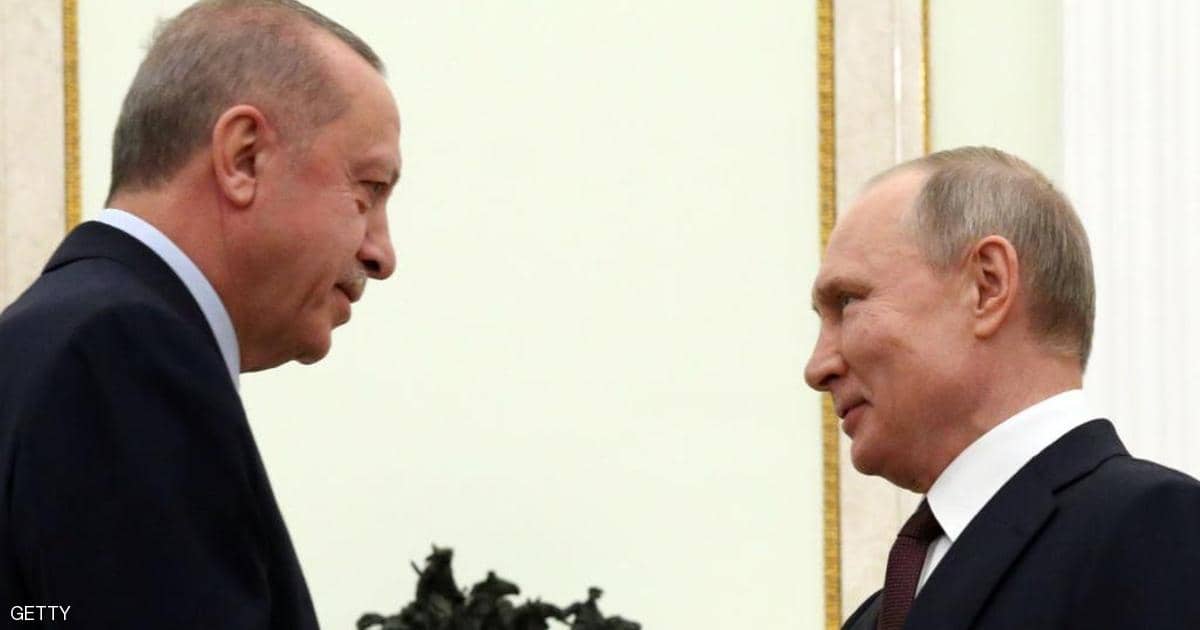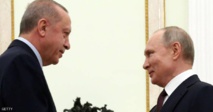The sides have also agreed to observe a security corridor through a major highway in Idlib, Syria's last rebel stronghold, near the Turkish border. The agreement was announced after about six hours of talks between the Russian and Turkish leaders in Moscow.
"We will first impose a ceasefire as soon as possible, then will swiftly take other steps that we agree on," Erdogan told reporters. He cautioned that Turkey would retaliate to any attack by Syrian state forces.
The meeting took place amid growing concerns about an emerging proxy war between Turkey, which supports certain rebel groups in Syria's multi-sided civil war, and Russia, the main military backer of the Syrian state.
Turkey has suffered dozens of casualties after sending troops into the north-western Idlib region in recent weeks, to counter advances made by Syrian state forces into rebel-held areas.
According to Putin, however, the Syrian military did not know it was fighting Turkish troops, because their location had not been shared.
"No one, including Syrian forces, knew about their location," Putin told Erdogan at the meeting during their public opening remarks. The Syrian military also suffered "serious losses," the Russian president noted.
However, shortly after an attack last week in which more than 30 Turkish soldiers were killed, Turkish Defence Minister Hulusi Akar had charged that the onslaught continued although the troops' location had been shared with Russia. Ambulances were also hit, he said.
A previous ceasefire deal for Idlib quickly fell apart. Turkey and Russia have been accusing each other of failing to adhere to that agreement.
"The [Syrian] regime, which threatens the stability of the region with its aggression, is the primary responsible for breaking the Idlib agreement," Erdogan, standing alongside Putin, told a press conference.
Erdogan accused the Syrian military of having directly targeted civilians. He said an estimated 1.5 million people from the Idlib region had moved towards Turkey's borders.
Turkey has deployed troops to Idlib to "maintain stability as part of a deal with Russia," Erdogan said.
Thursday's agreement called for a cessation of "all military actions along the line of contact in the Idlib de-escalation area" and a security corridor to be established six kilometres deep to the north and south of the M4 highway.
Turkey and Russia were also to conduct joint patrols along the M4 highway from the settlement of Trumba to the settlement of Ain-al-Havr, the agreement said.
Erdogan was accompanied in Moscow by a large delegation, including his defence, finance and foreign ministers.
During the meeting, Erdogan referred to the strong economic relationship between Turkey and Russia, while Putin expressed a hope that the situation in Syria would not damage their relations.
Previously robust ties between Turkey and Russia were frayed five years ago when Turkish forces shot down a Russian warplane on the Syrian border. Relations began to recover about half a year later.
Germany, which has taken in hundreds of thousands of Syrian asylum seekers, announced that it would provide the United Nations with an additional 100 million euros (110 million dollars) in aid for people in need in Idlib.
"The scale of the humanitarian catastrophe in Idlib is dramatic," German Foreign Minister Heiko Maas said ahead of a meeting with his EU counterparts in Zagreb on Thursday.
Maas linked the money to clear preconditions: "Humanitarian access and the protection of aid workers and the population must be guaranteed."
EU foreign policy chief Josep Borrell has backed a call for a no-fly zone in Idlib. However, the issue is foremost a question for NATO or the United Nations, rather than the European Union, Borrell noted.
An independent monitoring group said that the previous night Russian airstrikes hit a refugee camp in Idlib.
The attack, on the town of Maaret Misreen, killed at least 15 civilians and wounded more than a dozen others, the Syrian Observatory for Human Rights said.
The escalating violence in Idlib has stoked concerns among some EU member states of another wave of refugees from war-torn Syria, after the bloc struggled to contain a surge in arrivals in 2015-16.
"We will first impose a ceasefire as soon as possible, then will swiftly take other steps that we agree on," Erdogan told reporters. He cautioned that Turkey would retaliate to any attack by Syrian state forces.
The meeting took place amid growing concerns about an emerging proxy war between Turkey, which supports certain rebel groups in Syria's multi-sided civil war, and Russia, the main military backer of the Syrian state.
Turkey has suffered dozens of casualties after sending troops into the north-western Idlib region in recent weeks, to counter advances made by Syrian state forces into rebel-held areas.
According to Putin, however, the Syrian military did not know it was fighting Turkish troops, because their location had not been shared.
"No one, including Syrian forces, knew about their location," Putin told Erdogan at the meeting during their public opening remarks. The Syrian military also suffered "serious losses," the Russian president noted.
However, shortly after an attack last week in which more than 30 Turkish soldiers were killed, Turkish Defence Minister Hulusi Akar had charged that the onslaught continued although the troops' location had been shared with Russia. Ambulances were also hit, he said.
A previous ceasefire deal for Idlib quickly fell apart. Turkey and Russia have been accusing each other of failing to adhere to that agreement.
"The [Syrian] regime, which threatens the stability of the region with its aggression, is the primary responsible for breaking the Idlib agreement," Erdogan, standing alongside Putin, told a press conference.
Erdogan accused the Syrian military of having directly targeted civilians. He said an estimated 1.5 million people from the Idlib region had moved towards Turkey's borders.
Turkey has deployed troops to Idlib to "maintain stability as part of a deal with Russia," Erdogan said.
Thursday's agreement called for a cessation of "all military actions along the line of contact in the Idlib de-escalation area" and a security corridor to be established six kilometres deep to the north and south of the M4 highway.
Turkey and Russia were also to conduct joint patrols along the M4 highway from the settlement of Trumba to the settlement of Ain-al-Havr, the agreement said.
Erdogan was accompanied in Moscow by a large delegation, including his defence, finance and foreign ministers.
During the meeting, Erdogan referred to the strong economic relationship between Turkey and Russia, while Putin expressed a hope that the situation in Syria would not damage their relations.
Previously robust ties between Turkey and Russia were frayed five years ago when Turkish forces shot down a Russian warplane on the Syrian border. Relations began to recover about half a year later.
Germany, which has taken in hundreds of thousands of Syrian asylum seekers, announced that it would provide the United Nations with an additional 100 million euros (110 million dollars) in aid for people in need in Idlib.
"The scale of the humanitarian catastrophe in Idlib is dramatic," German Foreign Minister Heiko Maas said ahead of a meeting with his EU counterparts in Zagreb on Thursday.
Maas linked the money to clear preconditions: "Humanitarian access and the protection of aid workers and the population must be guaranteed."
EU foreign policy chief Josep Borrell has backed a call for a no-fly zone in Idlib. However, the issue is foremost a question for NATO or the United Nations, rather than the European Union, Borrell noted.
An independent monitoring group said that the previous night Russian airstrikes hit a refugee camp in Idlib.
The attack, on the town of Maaret Misreen, killed at least 15 civilians and wounded more than a dozen others, the Syrian Observatory for Human Rights said.
The escalating violence in Idlib has stoked concerns among some EU member states of another wave of refugees from war-torn Syria, after the bloc struggled to contain a surge in arrivals in 2015-16.









 Home
Home Politics
Politics











